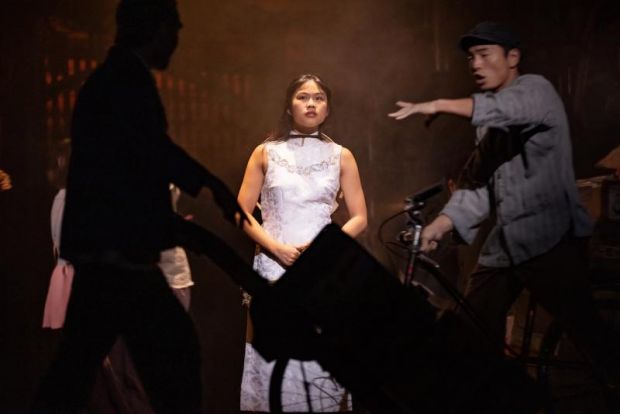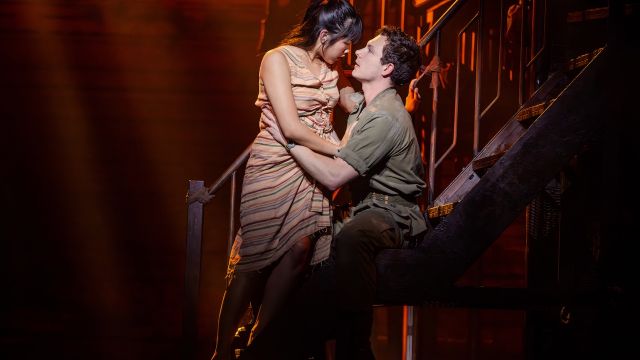Miss Saigon.
‘For men, will always be men; you change the regime, the lust doesn't stop’ – sung with glee by The Engineer, these words reflect the world beyond Miss Saigon. Whether it’s the wars in Vietnam, those wars more contemporary, or even this new production of the Boubil-Schönberg musical. Based on Cameron Mackintosh’s 2014 West End revival and presented by GWB Entertainment and Opera Australia, the show is famous for its spectacle, infamous for its controversies.
And it doesn’t disappoint on spectacle: the enormously tall set glides around the Festival Centre stage parading its stylised bamboo structures, breathtakingly lit blending bold and bashful to illuminate and shadow. Though there’s nothing reserved about the action on stage: the loud, extraordinarily busy opening number of ‘The Heat is On’ has the audience not knowing where to look with so much happening at once in both song and dance.

The main players are quickly established in 1975 Saigon, nearing the end of the Vietnam War: bored American marines are wasting their time and money with the prostitutes of Saigon, asserting their pale male dominance in the slums of a city turned upside down by ideological conflict; the women at the city bar ‘Dreamland’ are all sexy and sassy – but kept in check by a fun-loving and amoral Engineer (Seann Miley Moore).
Whilst the other women are cynical, greedy for money and a visa out of the country, the new arrival, Kim, is idealistic, refuses payment (though her pimp, The Engineer, is happy to take it for themselves), and despite the recent trauma of watching her parents burn to death in front of her, falls instantly in love with Chris, a similarly idealistic marine, uncertain what he’s still doing in a war from which his country had deserted.

The consummation of their love is brief, and they are almost immediately separated from each other as the US pulls out the last of its military from the city the next day.
Seann Miley Moore (SMM) takes the Engineer in a different direction to the original 1989 interpretation by the inappropriately cast Jonathan Pryce. SMM’s interpretation is cheekier, sexier – and more sexualised – and their ‘American Dream’ is superb – they’re having a blast wrapping the audience around their finger. Yet it’s missing the menace: there are moments of anger and hate that should be spat at the Americans, yet there is no heat in their threats, and the malice emerges as sarcasm and sass.
Abigail Adriano first appears as a nervous, uncomfortable Kim – yet her voice is at least twice as big as the Adelaide stage. She embodies a young woman finding her way, gaining confidence, demonstrating power, and her head-over-heels swooning for her US saviour is tempered with the unfamiliarity of this man.

That US soldier, Chris, is played by Nigel Huckle, and he is ample support for Adriano’s voice in the duets. Huckle’s Act 2 dilemma, when torn between two women, is convincing, and his lifelong but imperfect friendship with his marine mate, John, the also excellent Lewis Francis, is real. Francis’ voice leads the Act 2 opener ‘Bui Doi’, and together with a growing chorus of men, is wonderfully rousing.
The role of Ellen is always going to be a difficult one to play: Ellen is in love with Chris, discovers his Saigon secrets all too late, and must deal with the emotions of being in the middle of their resolution. Kerrie Anne Greenland fills this role with grace and perhaps an unnatural amount of reasonableness. She is vocally strong with her duets with Kim and Chris, and particularly her solo, ‘Maybe’ (an inferior replacement for the clumsy but powerful ‘Now That I’ve Seen Her’ from the original production).

The huge ensemble is universally excellent, with distinct definitions of their various characters from US Marines to North Vietnam Army; and tourists to touts. Particularly impressive is the breadth of character in each of the Vietnamese women. It would be hard to pull out any individual from the ensemble, though local lad Patrick Jeremy’s Assistant Commissar is wonderfully expressive.
The staging by Bob Avian and Geoffrey Garratt is fantastic – whether the performers are moving around the stage and never running into each other, or in synchronised dance (choreographer Richard Jones).
For the most part, the technical aspects of the production are the standard you demand – impressive and detailed production design (Totie Driver & Matt Kinley, with local set design by David Harris), slick transitions, beautiful sound design (Mick Potter, with Nic Gray and Shelly Lee), and spot-perfect lighting (Bruno Poet, with Warren Letton and Hugh Hamilton). But for a show that’s been touring for a while, and enjoyed many previews here prior to opening night, it was disappointing to hear the opening few minutes so poorly mixed, making it challenging to distinguish leads from chorus from orchestra.

The frenetic street scenes, military parades, and, of course, the helicopter, are impressive in both scale and drama, yet the newer video projection in this production adds little to either. But these are bumps on the otherwise smooth audio-visual experience that lifts, rather than buries, the performances on stage.
The controversies of casting from the original production are largely absent here, with a wealth of talent from Asian, Australian and New Zealand backgrounds, but there are still obstacles that are clumsily navigated in the story – mostly variants of Western men having authority over Asian women – and whilst these could be explained away as a product of their time, there is little explanation given for how and why this wasn’t okay fifty years ago. There is also not much context for the war itself: much of the audience for this production may have little to no knowledge of what happened in Vietnam between the 1950s and 1970s.
But that doesn’t necessarily obstruct your enjoyment of Miss Saigon – and indeed, it may spur you to research that history after the show. The story of star-crossed lovers is recognisable: there are elements of Romeo & Juliet, Wuthering Heights, and Madame Butterfly, on which this story is based. Tales of children left behind when foreign armies go home are not unique to this time or this war. Even the futility of conflict, the why and what of two groups fighting to destroy each other, is hardly far from our minds with today’s wars in Ukraine and Gaza.

There is redemption in finding a love story amongst the rubble of that destruction, and Miss Saigon is a wonderful experience for the eyes, ears, and heart. In the words of Chris, and then Kim: ‘How in one night have we come so far?’.
Mark Wickett
Phoographer: Daniel Boud
Subscribe to our E-Newsletter, buy our latest print edition or find a Performing Arts book at Book Nook.

